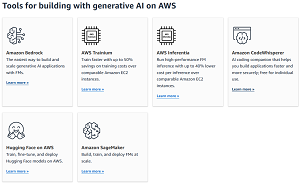News
Late to the Party, AWS Makes $100 Million Move to Foster Generative AI
AWS might be seen as late to the cloud giant AI party as Microsoft's "new Bing" rolled out along with multiple AI Copilots for many products and services, after which Google offered up its experimental Bard AI search engine while developing its own new large language models (LLMs), but Amazon has made some moves of its own.
In the latest, AWS today (June 22) launched the Generative AI Innovation Center, a new program that helps customers build and deploy generative AI solutions. AWS is investing $100 million in the program, which connects AWS AI and ML experts with customers around the world to help them design and launch new generative AI products, services and processes.
The program offers workshops, engagements and training to help customers use AWS generative AI services such as Amazon CodeWhisperer, Amazon Bedrock and Amazon Titan, as well as train and run their own models using high-performance infrastructure.
 [Click on image for larger view.] AWS AI Tools (source: AWS).
[Click on image for larger view.] AWS AI Tools (source: AWS).
The program also provides guidance on best practices for applying generative AI responsibly and optimizing machine learning operations to reduce costs. Highspot, Lonely Planet, Ryanair and Twilio are some of the customers that are engaging with the Innovation Center to explore developing generative AI solutions.
"The AWS Generative AI Innovation Center team of strategists, data scientists, engineers, and solutions architects will work step-by-step with customers to build bespoke solutions that harness the power of generative AI," AWS said in a news release. "For example, healthcare and life sciences companies can pursue ways to accelerate drug research and discovery. Manufacturers can build solutions to reinvent industrial design and processes. And financial services companies can develop ways to provide customers with more personalized information and advice."
While most industry pundits credit Microsoft (with the help of partner OpenAI, creator of ChatGPT) and Google with leading the AI charge among cloud giants, AWS in April announced announced Amazon Bedrock, a service that helps developers create foundation machine language models from Amazon and its partners -- AI21 Labs, Anthropic and Stability AI -- that are accessible via an API. More on that can be found in the Virtualization & Cloud Review article, "AWS Makes Its Own Generative AI Moves with 'Bedrock' Dev Service, New LLMs."
Just before that, AWS announced the AWS Generative AI Accelerator is a 10-week program designed to take the most promising generative AI startups around the globe to the next level. More on that can be found in the article, "While Some Call for AI Pause, AWS Launches Generative AI Accelerator."
As far as the latest Innovation Center initiative, AWS today published a blog post titled "What generative AI means for businesses and how AWS can help" that includes three key recommendations from AWS exec Uwem Ukpong for getting started with generative AI:
- Customers need to understand the foundations of AI and ML: Ukpong recommends that businesses brush up on how traditional AI led to generative AI, how foundation models work, and what responsible AI looks like in the generative era. AWS offers a wealth of resources on these topics that you can access to learn more.
- Companies should review the data that's available to them: To fine-tune generative AI models, businesses need quality datasets, and they need to understand the business potential that generative AI can unlock from their data.
- Business leaders should explore use cases for their companies: Ukpong recommends that businesses start identifying scenarios where generative AI could create new, valuable experiences for customers or truly improve a company's bottom line. Then, move some of those use cases from "art of the possible" to "art of the practical." Get strategic and be specific.
"The center's team of strategists, data scientists, engineers, and solutions architects, as well as experts from the AWS Partner Network, will work step-by-step with customers to build bespoke solutions that harness generative AI," Ukpong said. "For example, health care and life sciences companies can pursue ways to accelerate drug research and discovery. Manufacturers can build solutions to reinvent industrial design and processes. And financial services companies can develop ways to provide customers with more personalized information and advice."
About the Author
David Ramel is an editor and writer at Converge 360.